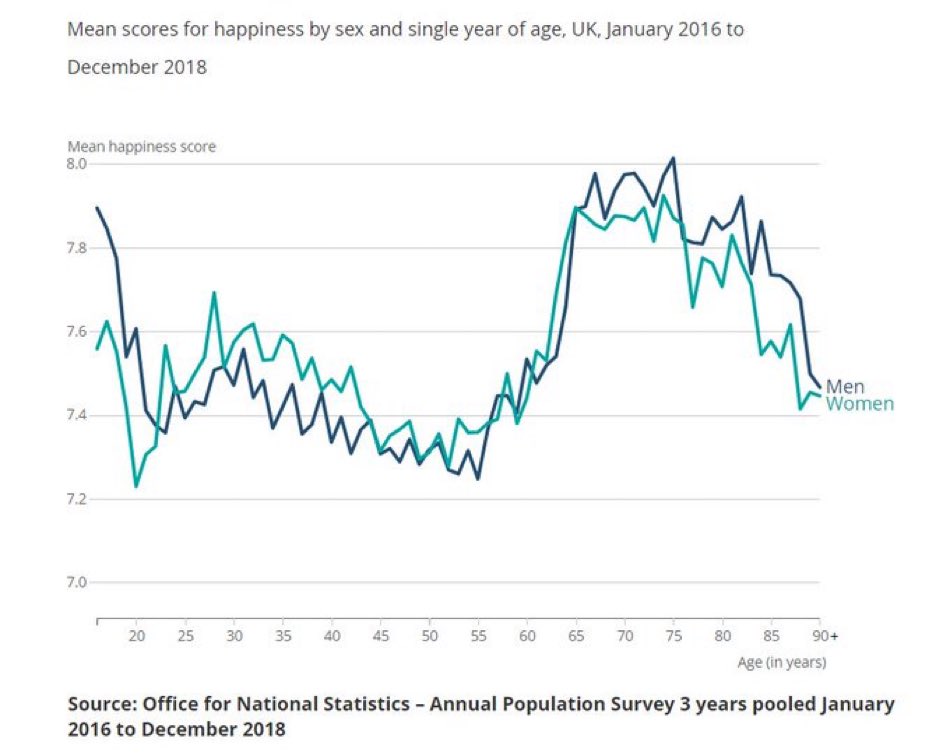Ah… but the good news is that people get happier as they get older (surveys suggest);
Yeah I agree with that, people most likely don’t know what healthspan means. I don’t think they phrased the question in a good way.
The Y axis on the graph is truncated. So the difference isn’t that large.
And then you have a different opinion…
Why you should never retire
Pleasure cruises, golf and tracing the family tree are not that fulfilling
People like Messrs Armani, Buffett or Munger are exceptional. But in remaining professionally active into what would historically be considered dotage, they are not unique. One poll this year found that almost one in three Americans say they may never retire. The majority of the nevers said they could not afford to give up a full-time job, especially when inflation was eating into an already measly Social Security cheque. But suppose you are one of the lucky ones who can choose to step aside. Should you do it?
The arc of corporate life used to be predictable. You made your way up the career ladder, acquiring more prestige and bigger salaries at every step. Then, in your early 60s, there was a Friday-afternoon retirement party, maybe a gold watch, and that was that. The next day the world of meetings, objectives, tasks and other busyness faded. If you were moderately restless, you could play bridge or help out with the grandchildren. If you weren’t, there were crossword puzzles, tv and a blanket.
Although intellectual stimulation tends to keep depression and cognitive impairment at bay, many professionals in the technology sector retire at the earliest recommended date to make space for the younger generation, conceding it would be unrealistic to maintain their edge in the field. Still, to step down means to leave centre stage—leisure gives you all the time in the world but tends to marginalise you as you are no longer in the game.
Full Economist Article here: https://archive.ph/7WAW2#selection-979.0-991.443
That’s assuming you mind being ‘marginalized’. Honestly, I doubt if anyone would notice or care if I retired. I would be replaced and the memory of my influence would fade. You can see that with Munger already now that he has passed. Do we really remember the corporate titans from 10 or 20 years ago who retired? Everyone is forgotten, so worrying about it and trying to stay on the stage of life is a fools errand.
However when I retire, I want to be active in the lives of my parents, wife, and children. I don’t plan to stay home every day. I’ll hit the gym more, travel more hike more and binge watch Netflix more (we’re being honest here). ![]()
I want to live my life on my terms, and as much as I love my job, I will also embrace what comes after.
Rapamycin IS the big breakthrough. Or am I missing something. There will surely be many more “breakthroughs” to come, but so much of past so called breakthroughs turn out to be nothing more than silver bullet baloney. Most great discoveries have been stumbled upon. Not “discovered” by some big organization collecting billions of dollars for research like the American Cancer Society. The Big Pharma/Medical Dr cabal has a vested interest in the status quo.
Well they would obviously have to work longer if they lived 10 years longer. But unless you really screw up, these extra years should be better. Most people spend so much of their working life saving and paying a mortage and when you have finally paid it off, your living cost would be lower and you could get away with working less. It’s so annoying that normal life is spending 40 years to work to build a life and when you’re done you don’t get much time to enjoy it. If you add 10 healthy years of life, you wouldn’t expect to just spend 10 extra years in retirement, unless you’re wealthy, but you should at least be able to work only part time those extra 10 years.

